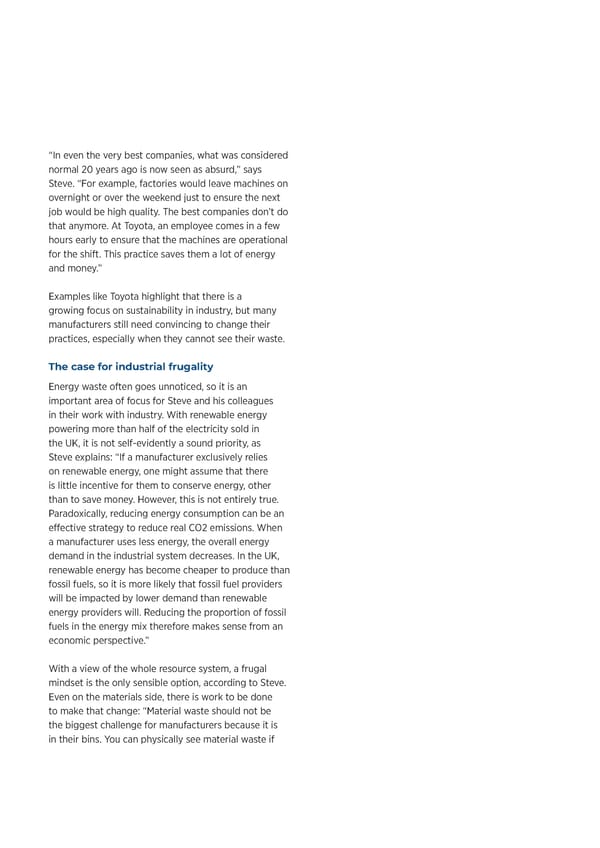“In even the very best companies, what was considered normal 20 years ago is now seen as absurd,” says Steve. “For example, factories would leave machines on overnight or over the weekend just to ensure the next job would be high quality. The best companies don’t do that anymore. At Toyota, an employee comes in a few hours early to ensure that the machines are operational for the shift. This practice saves them a lot of energy and money.” Examples like Toyota highlight that there is a growing focus on sustainability in industry, but many manufacturers still need convincing to change their practices, especially when they cannot see their waste. The case for industrial frugality A material world Energy waste often goes unnoticed, so it is an Manufacturing serves the purpose of producing important area of focus for Steve and his colleagues material goods for consumers, and industry has the in their work with industry. With renewable energy capacity to do so on a large scale. The sector’s history powering more than half of the electricity sold in of pollution and industry’s connection to consumerism, the UK, it is not self-evidently a sound priority, as however, may lead to the belief that manufacturing is Steve explains: “If a manufacturer exclusively relies incompatible with sustainability. This belief is incorrect on renewable energy, one might assume that there and fails to recognise that food, clothing, medicines, is little incentive for them to conserve energy, other building materials and other essential items are all than to save money. However, this is not entirely true. manufactured goods that we rely on. A sustainable Paradoxically, reducing energy consumption can be an industrial system is necessary to provide these e昀昀ective strategy to reduce real CO2 emissions. When goods to a global population of over 8 billion people. a manufacturer uses less energy, the overall energy Sustainability cannot be delivered by closing down demand in the industrial system decreases. In the UK, industry, which is good news, but we must increase our renewable energy has become cheaper to produce than innovative thinking and implement solutions. fossil fuels, so it is more likely that fossil fuel providers will be impacted by lower demand than renewable “It is hard to come up with general sustainability energy providers will. Reducing the proportion of fossil recommendations for manufacturers because they fuels in the energy mix therefore makes sense from an are so very di昀昀erent. We can’t say, ‘Do this to this economic perspective.” type of machine, do that to your schedule, do this to compressed air.’ But there is hope, because what we With a view of the whole resource system, a frugal 昀椀nd works consistently is to show people that waste is mindset is the only sensible option, according to Steve. happening. Each factory has its own toolkit for dealing Even on the materials side, there is work to be done with waste; we just need to show them that the waste is to make that change: “Material waste should not be there. We 昀椀nd that we don’t have to teach them how to the biggest challenge for manufacturers because it is identify changes that will improve the situation. They’re in their bins. You can physically see material waste if already good at that, and that is really quite important. you bother, but most people don’t bother. Even in our We must teach them how to see the waste so that they homes, waste tends to become psychologically invisible can tackle it,” says Steve. once the bin lid goes down, so we need to be told to look for it.”
 Sustainability Spotlight Magazine Page 4 Page 6
Sustainability Spotlight Magazine Page 4 Page 6